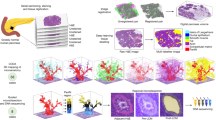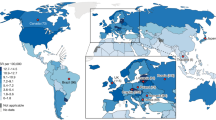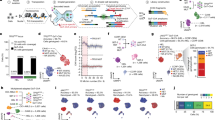Abstract
Silencing of gene expression by aberrant cytosine methylation is a prominent feature of human tumors, including colorectal cancers. Epigenetic changes of this type play undisputed roles in cell transformation when they involve genes that safeguard genome stability, and they can also be detected in precancerous lesions and seemingly normal peritumoral tissues. We explored physiological conditions associated with aberrant promoter methylation involving two DNA-repair genes in normal colorectal mucosa. Samples of cecal, transverse colon, sigmoid and rectal mucosa collected from 100 healthy individuals undergoing screening colonoscopy were analysed for hMLH1 and MGMT promoter methylation with a quantitative PCR assay. Positivity in at least one colon segment was common in both sexes, with methylation involving 0.1–18.8% of the alleles (median=0.49%). Samples from males showed no consistent patterns for either promoter, but there were striking age- and colon segment-specific differences in the female subgroup. Here, the prevalence of hMLH1 and MGMT methylation increased significantly with age, particularly in the right colon, where there was also an age-related increase in the percentage of alleles showing hMLH1 methylation. Concomitant methylation of both promoters was also significantly more common in the right colon of women. These findings paralleled immunohistochemical patterns of hMLH1 and MGMT protein loss in an independent series of 231 colorectal cancers and were consistent with current epigenetic profiles of colorectal cancer subsets. They suggest the intriguing possibility that the epigenetic signatures of cancers may have early-stage, normal-tissue counterparts that reflect potentially important aspects of the initial carcinogenetic process.
This is a preview of subscription content, access via your institution
Access options
Subscribe to this journal
Receive 50 print issues and online access
$259.00 per year
only $5.18 per issue
Buy this article
- Purchase on Springer Link
- Instant access to full article PDF
Prices may be subject to local taxes which are calculated during checkout





Similar content being viewed by others
Abbreviations
- CIMP:
-
CpG island methylator phenotype
- COBRA:
-
combined bisulfite restriction analysis
- MSI:
-
microsatellite instability
- qMSP:
-
quantitative methylation-specific PCR
References
Aaltonen LA, Peltomaki P, Leach FS, Sistonen P, Pylkkanen L, Mecklin JP et al. (1993). Clues to the pathogenesis of familial colorectal cancer. Science 260: 812–816.
Ahuja N, Li Q, Mohan AL, Baylin SB, Issa JP . (1998). Aging and DNA methylation in colorectal mucosa and cancer. Cancer Res 58: 5489–5494.
Al-Ghnaniem R, Peters J, Foresti R, Heaton N, Pufulete M . (2007). Methylation of estrogen receptor alpha and mutL homolog 1 in normal colonic mucosa: association with folate and vitamin B-12 status in subjects with and without colorectal neoplasia. Am J Clin Nutr 86: 1064–1072.
Anacleto C, Leopoldino AM, Rossi B, Soares FA, Lopes A, Rocha JC et al. (2005). Colorectal cancer ‘methylator phenotype’: fact or artifact? Neoplasia 7: 331–335.
Capel E, Flejou JF, Hamelin R . (2007). Assessment of MLH1 promoter methylation in relation to gene expression requires specific analysis. Oncogene 26: 7596–7600.
Chan AO, Broaddus RR, Houlihan PS, Issa JP, Hamilton SR, Rashid A . (2002). CpG island methylation in aberrant crypt foci of the colorectum. Am J Pathol 160: 1823–1830.
Deng G, Chen A, Hong J, Chae HS, Kim YS . (1999). Methylation of CpG in a small region of the hMLH1 promoter invariably correlates with the absence of gene expression. Cancer Res 59: 2029–2033.
Esteller M . (2008). Epigenetics in cancer. N Engl J Med 358: 1148–1159.
Esteller M, Toyota M, Sanchez-Cespedes M, Capella G, Peinado MA, Watkins DN et al. (2000). Inactivation of the DNA repair gene O6-methylguanine-DNA methyltransferase by promoter hypermethylation is associated with G to A mutations in K-ras in colorectal tumorigenesis. Cancer Res 60: 2368–2371.
Fox EJ, Leahy DT, Geraghty R, Mulcahy HE, Fennelly D, Hyland JM et al. (2006). Mutually exclusive promoter hypermethylation patterns of hMLH1 and O6-methylguanine DNA methyltransferase in colorectal cancer. J Mol Diagn 8: 68–75.
Gerson SL . (2004). MGMT: its role in cancer aetiology and cancer therapeutics. Nat Rev Cancer 4: 296–307.
Giovannucci E, Ogino S . (2005). DNA methylation, field effects, and colorectal cancer. J Natl Cancer Inst 97: 1317–1319.
Goel A, Nagasaka T, Arnold CN, Inoue T, Hamilton C, Niedzwiecki D et al. (2007). The CpG island methylator phenotype and chromosomal instability are inversely correlated in sporadic colorectal cancer. Gastroenterology 132: 127–138.
Greenspan EJ, Cyr JL, Pleau DC, Levine J, Rajan TV, Rosenberg DW et al. (2007). Microsatellite instability in aberrant crypt foci from patients without concurrent colon cancer. Carcinogenesis 28: 769–776.
Hiraoka S, Kato J, Tatsukawa M, Harada K, Fujita H, Morikawa T et al. (2006). Laterally spreading type of colorectal adenoma exhibits a unique methylation phenotype and K-ras mutations. Gastroenterology 131: 379–389.
Ionov Y, Peinado MA, Malkhosyan S, Shibata D, Perucho M . (1993). Ubiquitous somatic mutations in simple repeated sequences reveal a new mechanism for colonic carcinogenesis. Nature 363: 558–561.
Issa JP . (2004). CpG island methylator phenotype in cancer. Nat Rev Cancer 4: 988–993.
Issa JP, Ahuja N, Toyota M, Bronner MP, Brentnall TA . (2001). Accelerated age-related CpG island methylation in ulcerative colitis. Cancer Res 61: 3573–3577.
Issa JP, Ottaviano YL, Celano P, Hamilton SR, Davidson NE, Baylin SB . (1994). Methylation of the oestrogen receptor CpG island links ageing and neoplasia in human colon. Nat Genet 7: 536–540.
Jass JR, Whitehall VL, Young J, Leggett BA . (2002). Emerging concepts in colorectal neoplasia. Gastroenterology 123: 862–876.
Kane MF, Loda M, Gaida GM, Lipman J, Mishra R, Goldman H et al. (1997). Methylation of the hMLH1 promoter correlates with lack of expression of hMLH1 in sporadic colon tumors and mismatch repair-defective human tumor cell lines. Cancer Res 57: 808–811.
Kawakami K, Ruszkiewicz A, Bennett G, Moore J, Grieu F, Watanabe G et al. (2006). DNA hypermethylation in the normal colonic mucosa of patients with colorectal cancer. Br J Cancer 94: 593–598.
Kim SH, Bae SI, Lee HS, Kim WH . (2003). Alteration of O6-methylguanine-DNA methyltransferase in colorectal neoplasms in sporadic and familial adenomatous polyposis patients. Mol Carcinog 37: 32–38.
Kuismanen SA, Holmberg MT, Salovaara R, Schweizer P, Aaltonen LA, de La Chapelle A et al. (1999). Epigenetic phenotypes distinguish microsatellite-stable and -unstable colorectal cancers. Proc Natl Acad Sci USA 96: 12661–12666.
Lindblom A . (2001). Different mechanisms in the tumorigenesis of proximal and distal colon cancers. Curr Opin Oncol 13: 63–69.
Malkhosyan SR, Yamamoto H, Piao Z, Perucho M . (2000). Late onset and high incidence of colon cancer of the mutator phenotype with hypermethylated hMLH1 gene in women. Gastroenterology 119: 598.
Menigatti M, Di Gregorio C, Borghi F, Sala E, Scarselli A, Pedroni M et al. (2001). Methylation pattern of different regions of the MLH1 promoter and silencing of gene expression in hereditary and sporadic colorectal cancer. Genes Chromosomes Cancer 31: 357–361.
Menigatti M, Pedroni M, Verrone AM, Borghi F, Scarselli A, Benatti P et al. (2007). O6-methylguanine-DNA methyltransferase promoter hypermethylation in colorectal carcinogenesis. Oncol Rep 17: 1421–1427.
Minoo P, Baker K, Goswami R, Chong G, Foulkes WD, Ruszkiewicz AR et al. (2006). Extensive DNA methylation in normal colorectal mucosa in hyperplastic polyposis. Gut 55: 1467–1474.
Miyakura Y, Sugano K, Konishi F, Ichikawa A, Maekawa M, Shitoh K et al. (2001). Extensive methylation of hMLH1 promoter region predominates in proximal colon cancer with microsatellite instability. Gastroenterology 121: 1300–1309.
Momparler RL . (2003). Cancer epigenetics. Oncogene 22: 6479–6483.
Nakagawa H, Nuovo GJ, Zervos EE, Martin Jr EW, Salovaara R, Aaltonen LA et al. (2001). Age-related hypermethylation of the 5′ region of MLH1 in normal colonic mucosa is associated with microsatellite-unstable colorectal cancer development. Cancer Res 61: 6991–6995.
Ogino S, Cantor M, Kawasaki T, Brahmandam M, Kirkner GJ, Weisenberger DJ et al. (2006). CpG island methylator phenotype (CIMP) of colorectal cancer is best characterised by quantitative DNA methylation analysis and prospective cohort studies. Gut 55: 1000–1006.
Ogino S, Kawasaki T, Kirkner GJ, Suemoto Y, Meyerhardt JA, Fuchs CS . (2007). Molecular correlates with MGMT promoter methylation and silencing support CpG island methylator phenotype-low (CIMP-low) in colorectal cancer. Gut 56: 1564–1571.
Percesepe A, Borghi F, Menigatti M, Losi L, Foroni M, Di Gregorio C et al. (2001). Molecular screening for hereditary nonpolyposis colorectal cancer: a prospective, population-based study. J Clin Oncol 19: 3944–3950.
Reik W . (2007). Stability and flexibility of epigenetic gene regulation in mammalian development. Nature 447: 425–432.
Shen L, Kondo Y, Rosner GL, Xiao L, Hernandez NS, Vilaythong J et al. (2005). MGMT promoter methylation and field defect in sporadic colorectal cancer. J Natl Cancer Inst 97: 1330–1338.
Shen L, Toyota M, Kondo Y, Lin E, Zhang L, Guo Y et al. (2007). Integrated genetic and epigenetic analysis identifies three different subclasses of colon cancer. Proc Natl Acad Sci USA 104: 18654–18659.
Slattery ML, Potter JD, Curtin K, Edwards S, Ma KN, Anderson K et al. (2001). Estrogens reduce and withdrawal of estrogens increase risk of microsatellite instability-positive colon cancer. Cancer Res 61: 126–130.
Soetikno RM, Kaltenbach T, Rouse RV, Park W, Maheshwari A, Sato T et al. (2008). Prevalence of nonpolypoid (flat and depressed) colorectal neoplasms in asymptomatic and symptomatic adults. JAMA 299: 1027–1035.
Suzuki H, Watkins DN, Jair KW, Schuebel KE, Markowitz SD, Chen WD et al. (2004). Epigenetic inactivation of SFRP genes allows constitutive WNT signaling in colorectal cancer. Nat Genet 36: 417–422.
Thibodeau SN, Bren G, Schaid D . (1993). Microsatellite instability in cancer of the proximal colon. Science 260: 816–819.
Toyota M, Ahuja N, Ohe-Toyota M, Herman JG, Baylin SB, Issa JP . (1999). CpG island methylator phenotype in colorectal cancer. Proc Natl Acad Sci USA 96: 8681–8686.
Toyota M, Issa JP . (1999). CpG island methylator phenotypes in aging and cancer. Semin Cancer Biol 9: 349–357.
Truninger K, Menigatti M, Luz J, Russell A, Haider R, Gebbers JO et al. (2005). Immunohistochemical analysis reveals high frequency of PMS2 defects in colorectal cancer. Gastroenterology 128: 1160–1171.
Weisenberger DJ, Siegmund KD, Campan M, Young J, Long TI, Faasse MA et al. (2006). CpG island methylator phenotype underlies sporadic microsatellite instability and is tightly associated with BRAF mutation in colorectal cancer. Nat Genet 38: 787–793.
Whitehall VL, Walsh MD, Young J, Leggett BA, Jass JR . (2001). Methylation of O-6-methylguanine DNA methyltransferase characterizes a subset of colorectal cancer with low-level DNA microsatellite instability. Cancer Res 61: 827–830.
Xiong Z, Wu AH, Bender CM, Tsao JL, Blake C, Shibata D et al. (2001). Mismatch repair deficiency and CpG island hypermethylation in sporadic colon adenocarcinomas. Cancer Epidemiol Biomarkers Prev 10: 799–803.
Ye C, Shrubsole MJ, Cai Q, Ness R, Grady WM, Smalley W et al. (2006). Promoter methylation status of the MGMT, hMLH1, and CDKN2A/p16 genes in non-neoplastic mucosa of patients with and without colorectal adenomas. Oncol Rep 16: 429–435.
Acknowledgements
We thank Josef Jiricny at the Institute of Molecular Cancer Research of the University of Zurich and our colleagues at the Department of Biomedicine of the University of Basel for helpful discussions and support throughout the project. We are also grateful to Patric Urfer and Christophe Kunz for critical reading of the manuscript, Ritva Haider for technical assistance, and Marian E Kent for editorial assistance. The study was supported by the Swiss National Science Foundation (to GM), the Krebsliga Zentralschweiz (to GM), the Krebsliga Beider Basel (to PS), Julius-Müller Stiftung, Zürich (to KT) and the Hanne-Liebermann Stiftung, Zürich (to KT).
Author information
Authors and Affiliations
Corresponding author
Additional information
Supplementary Information accompanies the paper on the Oncogene website (http://www.nature.com/onc)
Rights and permissions
About this article
Cite this article
Menigatti, M., Truninger, K., Gebbers, JO. et al. Normal colorectal mucosa exhibits sex- and segment-specific susceptibility to DNA methylation at the hMLH1 and MGMT promoters. Oncogene 28, 899–909 (2009). https://doi.org/10.1038/onc.2008.444
Received:
Revised:
Accepted:
Published:
Issue Date:
DOI: https://doi.org/10.1038/onc.2008.444
Keywords
This article is cited by
-
Survival and long-term surgical outcomes after colorectal surgery: are there any gender-related differences?
Updates in Surgery (2022)
-
Longitudinal analysis of healthy colon establishes aspirin as a suppressor of cancer-related epigenetic aging
Clinical Epigenetics (2020)
-
DNA methylation instability by BRAF-mediated TET silencing and lifestyle-exposure divides colon cancer pathways
Clinical Epigenetics (2019)
-
Analysis of the DNA methylation level of cancer-related genes in colorectal cancer and the surrounding normal mucosa
Clinical Epigenetics (2017)
-
Colorectal Cancer Screening and Prevention in Women
Digestive Diseases and Sciences (2015)



